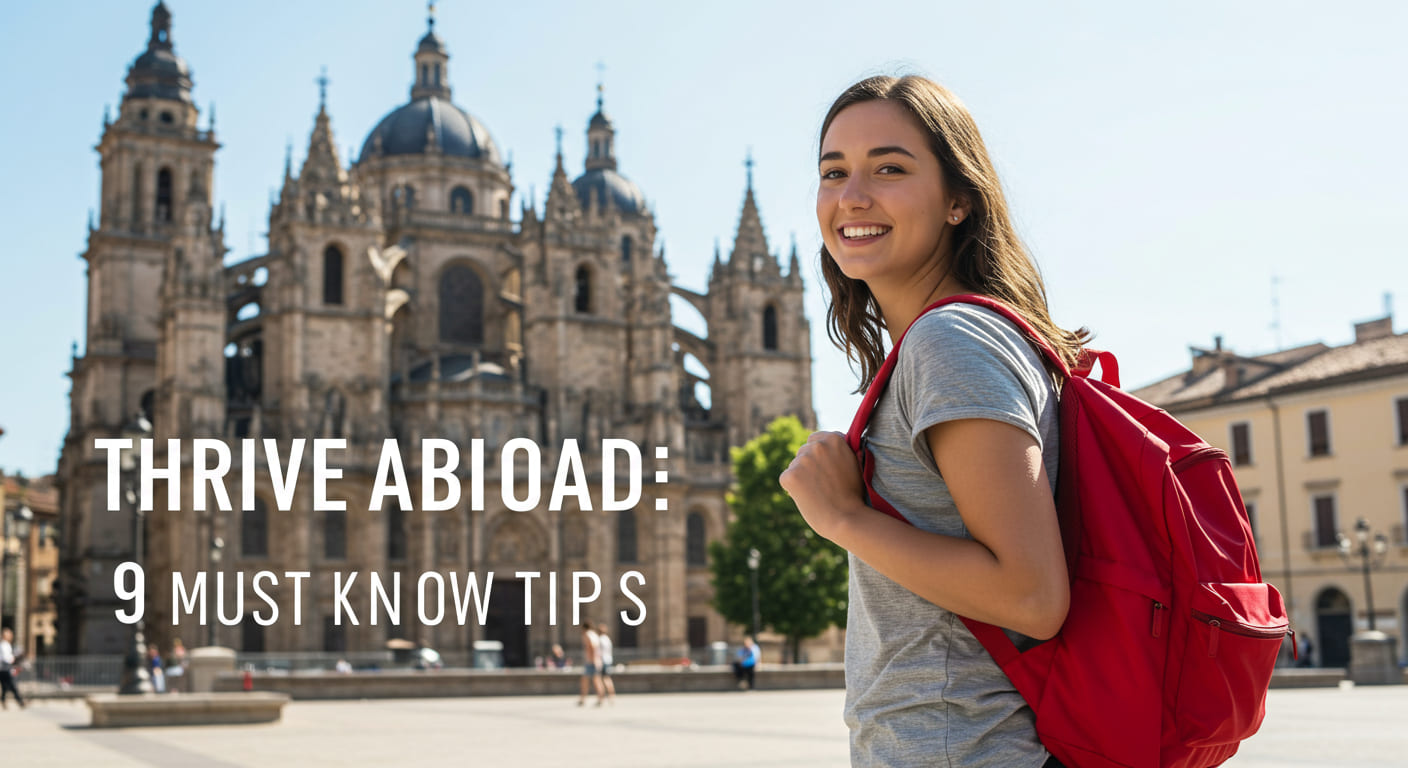Being an international student can be as intimidating as it is exciting. Just imagine being in a foreign country in which you are independently supposed to navigate a crowded airport for the first time, and step into a class where a completely new language is spoken. You have ample freedom to build, explore, and redesign your image — however, there are challenges that nobody prepares you for. Whether it is trying to learn a new language, or having dreams of relaxing in a European café while sipping on coffee, studying abroad has its unique challenges that inspires unparalleled personal and professional opportunities. Based on my real-life experiences, this article seeks to equip you for your journey by outlining 10 essential insights. How about we explore these together, and see how you can flourish in a foreign land?
As any new or returning international student can tell you, travelling to a new country can be quite a daunting task, especially if this is your first solo trip. It can seem like you are glancing over a new maze in the form of an airport, and the idea of going through it alone can cause jitters. But you don’t need to feel overwhelmed as I have a solution to make it a lot more fun. Engaging and connecting with your peers in the same travel program as you can make the trip a lot more exciting, and relaxing, especially if you arrange to travel with them.
Working together while sitting on the airplane or navigating through airport signs fosters teamwork and trust. What is the earliest way you can connect with your colleagues before your trip? Consider reaching out through group messages or program social gatherings—small initiatives that have quite an impact.
1. Give Yourself Time to Navigate
Every new country comes with a new set of signs, systems, and a language. If you are already battling with a new language, navigating through streets or using public transport might become increasingly stressful. Always give yourself ample time to figure things out, whether it is about finding your class or getting a bus on time. Always arrive early, explore slowly, and appreciate the fact that moving one place to another is part of adventure. This newfound buffer helps you stay calm, appreciate the process, and turn anticipated chaos into a learning chance.
What’s one place you’re excited to explore at your own pace?
2. Embrace Every Opportunity
Make the most out of every opportunity that comes your way. Using all of them to step outside your comfort zone is essential when considering studying abroad. An uninspiring excursion and an entire cooking class might seem appealing, but saying yes will most certainly earn you new memories. Some joy and confidence for trying an entirely new flamenco dance class, or a weekend trip to a neighbouring city is bound to arise. Do not let fear hold you back because those moments of hesitation could be the most remarkable highlights of your trip. What’s one activity you’re excited, but nervous, to try?
3. Be Prepared for Cultural Differences
From the most basic means of communication to the way in which people dress, cultural norms and etiquette vary extremely from region to region. These everyday life interactions from abroad can and will surprise you.
A case in point might be the attention that ripped jeans could attract in certain places, or the fact that the service in a restaurant might necessitate that you call the waiter to attend to you. Try to understand the locals’ practices prior to your arrival but be prepared to learn from experiences. These differences do not serve as hindrances; they provide you with the chance to enhance your cultural appreciation and appreciation. In what ways can you get ready to satisfy your curiosity regarding these differences?
4. Save Space and Pack Light
Most likely, you are going to want to buy some souvenirs for yourself, or perhaps some clothing, particularly after discovering how unique local shops are. For your convenience, pack light, as this will help you save room in your luggage. This helps avoids high baggage fees, and also allows you to take advantage of the local style or other gifts you wish to purchase for your friends. Consider your suitcase a canvas and don’t forget to reserve space on your canvas for items that showcase your experiences throughout your travels. What is one item you would be eager to purchase?
5. Utilize the Local Dialects
If you are visiting a country where your native language is not spoken, make an effort to learn the language as much as achievable. Interacting with the locals, whether it is ordering food or having a casual chat with acquaintances, make for fantastic confidence boosting opportunities and enrich your whole experience. You do not need to be concerned about errors because asking questions and hopefully making mistakes is how you will improve.
Consider the excitement of placing an order in Spanish or of a local answering in their language. How will you ensure you interact with the language on a daily basis?

6. Deal with Host Family Adaptations
With a host family s a rich way to get involved in the culture, but it is not perfect. The food may differ, their level of cleanliness might not match yours, or even how they communicate can be different. If issues arise, it is best to speak to your program coordinator. They are able to help you with your problems. On the other side, host families give unique opportunities to practice the language and learn to feel at home. Go into it without bias and you will learn a lot from what no dorm could offer. What is one thing you would steal from a host family?
7. Balance Class and Adventure
Studying abroad is not a vacation, but school in a new location. The classes, especially in a foreign language, can be quite gruelling, particularly at a quick pace or with difficult content. If you are feeling overwhelmed, try taking it one day at a time and don’t hesitate to look for help or change classes. Balance gives you the opportunity to excel academically and appreciate the new culture. How do you plan to ensure you have both fun and learn while exploring?
8. Stay Connected to Home
Whether it’s a holiday or just an extended stay, homesickness can hit hard. Keeping in touch with family and friends on a regular basis can help settle you and make it easier to adapt to new surroundings. A chat with mom or a video call with friends can do wonders for your mood and remind you that you’re not all alone. Plan to stay connected without disrupting your adventures. Who will be the first person you call when you land?
9. Bring Cash and Be Open to New People
Always have cash on you for places that do not take cards such as laundromats and niche stores. Cash is also handy for surprise expenses such as paying a sponsoring family for doing your laundry. Most importantly, be willing to embrace new people, whether it’s locals, fellow students, or other travellers. Such relationships could become some of the best you have and greatly improve your experience. Go beyond your comfort zone, and you may just find your best friend. While abroad, who are you looking forward to meeting?
Key Takeaways
- Travel with friends: Coordinate with peers for flights and airport navigation to ease stress.
- Take your time: Allow extra time to navigate new places without rushing.
- Say yes to new experiences: Embrace excursions and cultural activities for unforgettable moments.
- Learn local norms: Research customs to feel more comfortable and avoid surprises.
- Pack smart: Leave luggage space for souvenirs and local finds.
- Speak the language: Practice the local language to boost confidence and connection.
- Communicate with host families: Address concerns openly for a better living experience.
- Balance academics and fun: Stay organized to excel in class and enjoy adventures.
- Stay connected: Regular calls home can ease homesickness and keep you grounded.
- Be prepared and social: Carry cash and be open to meeting new people for a richer experience.
Conclusion
Studying abroad is a unique journey, and no two experiences are the same. Whether you’re dancing Flamenco, exploring ancient cities, or tackling a tough class, the key is to stay open, prepared, and curious. These insights aren’t rigid rules but tools to help you craft your own adventure. Start small—maybe it’s packing light or practicing a new phrase—and see where the journey takes you. Your time abroad can be transformative, so embrace it with an open heart and fearless spirit. What’s the first step you’ll take to make your study abroad experience unforgettable?
